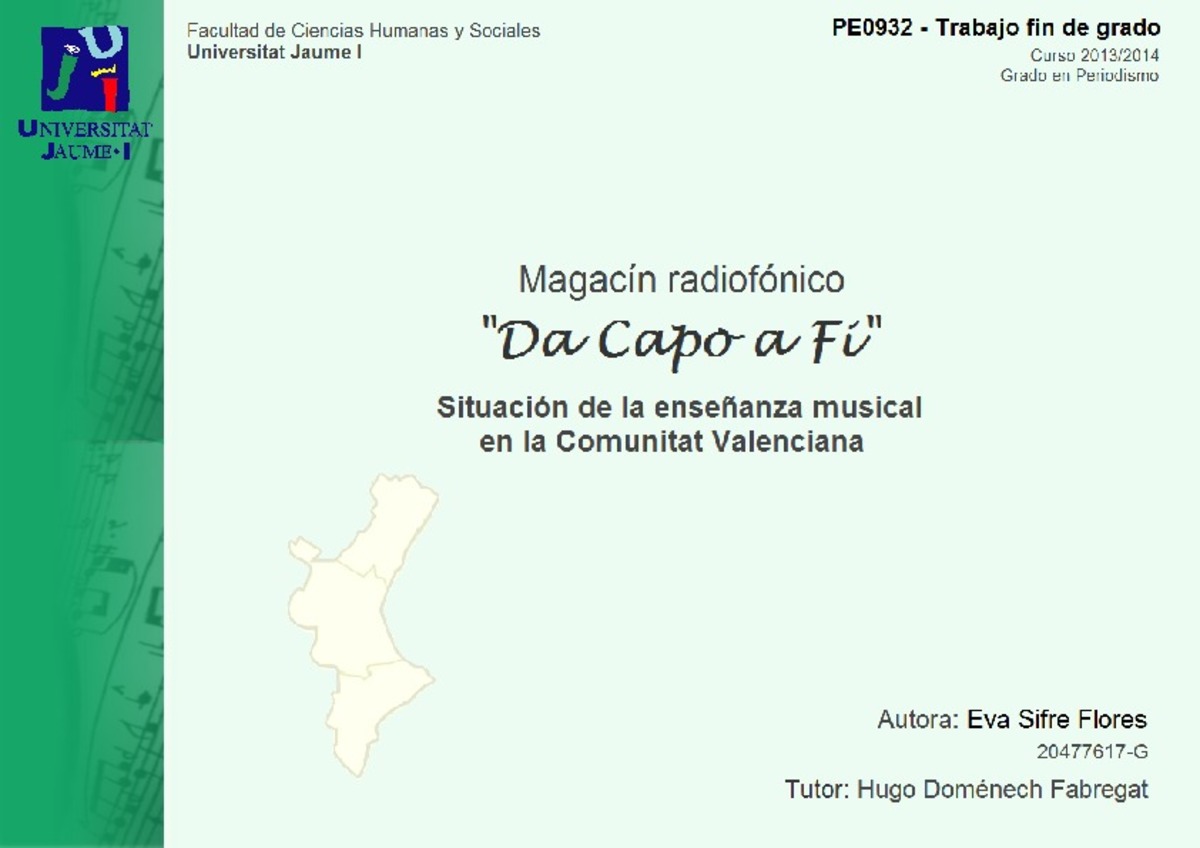Mostrar el registro sencillo del ítem
"Da Capo a fi": magazín radiofónico
| dc.contributor | Doménech Fabregat, Hugo | |
| dc.contributor | Universitat Jaume I. Departament de Ciències de la Comunicació | |
| dc.contributor.author | Sifre Flores, Eva | |
| dc.date.accessioned | 2015-02-03T09:14:55Z | |
| dc.date.available | 2015-02-03T09:14:55Z | |
| dc.date.issued | 2014-06-05 | |
| dc.identifier.uri | http://hdl.handle.net/10234/113724 | |
| dc.description | Treball final de Grau en Periodisme. Codi: PE0932. Curs acadèmic 2013-2014 | ca_CA |
| dc.description.abstract | In my final project for this degree, I wanted to diagnose the health of music in the Valencian Community by reaching the Musical Societies and their schools of education on the one hand, and on the other hand the Higher Musical Education and its career opportunities. There are two main reasons for my work. Since my initial training as a journalist, I have tried to understand a little better the problems of a world that I have known first hand since my childhood. A world which I belong to and in which I participate actively from my training as a horn player and my membership in a local band. A world for which I have much interest both personally and professionally. My work seeks to modestly demonstrate the reality of the world of professional musicians affected, like many others, by the crisis we are experiencing. I would like to add one more justification for the medium chosen to develop my project, the radio. It could not be otherwise, because if there is something that unites music with radio, it is the object that both are made of and that is none other than the sound and silence. The goals that I have set in this project are: Regarding programme content: -To know the existing infrastructure in the Valencian Community regarding the initial and basic training and to show its importance in the existing musical culture in our land. -To analyze the higher musical training, its quality and to try to diagnose its weaknesses and its main problems. -To study the range of theoretical possibilities for this profession from testimonies of its main protagonists, teachers and students about to obtain their degree. -Finally to modestly contribute to dignify and give rise to this profession and to this world, sensitizing the audience of the importance of music in our lives and of its educational and social significance. Regarding the implementation of the programme: -To implement all the technical skills acquired throughout the degree and the ability to control the various stages of production. -To exercise the ability to manage, analyse and synthesize information correctly. While developing the Project, I underwent three phases: Pre-production. I thought and imagined the programme for which I took into consideration: To locate the programme: think of the audience, channel, frequency, timing, duration. To set the goals, the intentions I pursue. To determine the content, the message and provide it with a structure that allows for the script to follow. To select the genre or format. In this case a magazine containing the article and the interview. To develop the script for the two articles and the interview. To search for sources of literature, music and human information. To select the participants and different sources, as well as contacts. To establish a timetable. To schedule time to conduct questionnaires and interviews and to coordinate it with the testimonies. To consider resources: necessary equipment, recorder, space, radio room. Production of sound material: In this second phase, I did the recording work of the interventions and I also carried out the interview. In all the recordings I have tried: To get the correct meaning of the text and achieve the desired intention, trying to adjust it to the required times. To be aware of the technical work: good recording levels and zero noise. To perform the functions of producer, broadcaster, editor and sound technician. Post_production The time when all recorded material is set in the right place to be assembled and edited following the script corresponds to the last phase, the post-production. I deleted confusing and repetitive sentences, long pauses, noise, until I obtained the essential and necessary material. I carried out the editing: voice resources (locutions, off, interview), music and effects. All this logically and harmonically bound in the production under a given structure. I Introduced advertising, properly locating it at the closing time of the reports and at the beginning of the interview. I conducted a full listening and I made the last corrections leaving the program ready to be broadcast. | ca_CA |
| dc.format.extent | 1 fichero audio + 1 llibre (60 p.) | ca_CA |
| dc.format.mimetype | audio/mpeg | ca_CA |
| dc.language.iso | cat | ca_CA |
| dc.language.iso | spa | ca_CA |
| dc.publisher | Universitat Jaume I | ca_CA |
| dc.rights | Attribution-NonCommercial-ShareAlike 4.0 Spain | * |
| dc.rights.uri | http://creativecommons.org/licenses/by-nc-sa/4.0/ | * |
| dc.subject | Grau en Periodisme | ca_CA |
| dc.subject | Grado en Periodismo | ca_CA |
| dc.subject | Bachelor's Degree in Journalism | ca_CA |
| dc.subject | Magazine radiofónico | ca_CA |
| dc.subject | Radio magazin | ca_CA |
| dc.title | "Da Capo a fi": magazín radiofónico | ca_CA |
| dc.title.alternative | Magazín radiofónico: "Da Capo a fi": situación de la enseñanza musical en la Comunidad Valenciana | ca_CA |
| dc.type | info:eu-repo/semantics/bachelorThesis | ca_CA |
| dc.educationLevel | Estudios de Grado | ca_CA |
| dc.rights.accessRights | info:eu-repo/semantics/openAccess | ca_CA |
Ficheros en el ítem
Este ítem aparece en la(s) siguiente(s) colección(ones)
-
Grau en Periodisme [580]
PE0932








